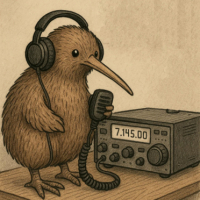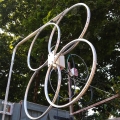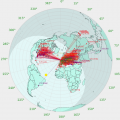rrobinet
I have configured several Kiwis for wifi access by attaching an inexpensive router configured as a Wifi client to the ethernet port of the Kiwi. This $25 TP Link has worked well for me:
https://smile.amazon.com/TP-Link-Wireless-Portable-Travel-Router/dp/B00TQEX8BO/ref=sr_1_14?keywords=tplink+wifi+router&qid=1548188019&sr=8-14
In principle one could enable the internal BB Wifi or attach a USB wifi adapter, but I am reluctant to fiddle with the Kiwi's OS.
About
- Username
- rrobinet
- Joined
- Visits
- 1,325
- Last Active
- Roles
- Member
- Points
- 9
-
wsprdaemon - A Raspberry Pi WSPR decoding service
This is a major upgrade in functionality, reliability and installability from previous versions of wsprdaemon and its predecessor kiwiwspr.sh
Configured to connect to two Kiwis configured in 8 channel mode, it easily simultaneously decodes all 14 WSPR LF/MF/HF WSPR bands during every two minute cycle and reliably uploads spots to wsprnet.org
To install it:
1) login to the Pi as user 'pi' (or other non-root user) and create the directory '~/wsprdaemon'.
2) copy the attached file to that directory, rename it to 'wsprdaemon.sh', and make it executable with 'chmod +x '
3) cd to that directory and execute it: './wsprdaemon.sh'. It should walk you through the installation of all of the utility programs it needs and create a prototype 'wsprdaemon.conf' file
4) edit the wsprdaemon.conf file following the directions in it
5) to start the daemon: './wsprdaemon.sh -a'
6) to see the daemon status: './wsprdaemon.sh -s'
7) to stop the daemon: './wsprdaemon.sh -z'
8) for help about the daemon: './wsprdaemon.sh -h'
During installation it creates a tmpfs files system '/tmp/wspr-captures/...' where all of the recordings and logs are kept, so 24/7 recording of 14 bands => 3 Mbps of wav files doesn't wear out your microSD in a few months
It also modifies the systemclt files so the daemon will autostart during a powerup or reboot.
I have tested installation and operation on a clean 'Stretch' OS. The script can run in other Debian servers, but installation may require some custom tweaks. -
Running AI6VN's kiwiwspr.sh in a Docker container
In future versions I will make it possible to suppress the registration of the service to run at startup. Unfortunately I see no way to merge the recording, decoding and posting into a single thread. So monitoring and diagnostic printouts would be jumbled together if they were all going to stdout or stderr. Still, I like your attempt to simplify installation and will consider how to address it. I am currently working to expand the supported receivers beyond the Kiwi so that VHF/UHF signals can be spotted by RTL-SDRs and other receivers, but the Kiwi is the best and cheapest receiver for LF/MF/HF reception. -
Running AI6VN's kiwiwspr.sh in a Docker container
In future versions I will make it possible to suppress the registration of the service to run at startup. Unfortunately I see no way to merge the recording, decoding and posting into a single thread. So monitoring and diagnostic printouts would be jumbled together if they were all going to stdout or stderr. Still, I like your attempt to simplify installation and will consider how to address it. I am currently working to expand the supported receivers beyond the Kiwi so that VHF/UHF signals can be spotted by RTL-SDRs and other receivers, but the Kiwi is the best and cheapest receiver for LF/MF/HF reception. -
8 channel Kiwi WSPR decoding script 'kiwiwspr.sh' using Raspberry Pi or other external server
Thanks. It is gratifying to be part of such an active and dedicated group.
Everyone using the Kiwi, especially for WSPR, should upgrade to v 1.242. It corrects a bug which introduced -40dB +/- 23 Hz sidebands to spots of > +10 dB SNR. Even more important, it appears to have improved SNRs by about 2 dB which means the Kiwi will detect low SNR spots which it missed before. -
8 channel Kiwi WSPR decoding script 'kiwiwspr.sh' using Raspberry Pi or other external server
Thanks. It is gratifying to be part of such an active and dedicated group.
Everyone using the Kiwi, especially for WSPR, should upgrade to v 1.242. It corrects a bug which introduced -40dB +/- 23 Hz sidebands to spots of > +10 dB SNR. Even more important, it appears to have improved SNRs by about 2 dB which means the Kiwi will detect low SNR spots which it missed before.






